
Scotland is a country that is part of the United Kingdom. It contains nearly one-third of the United Kingdom's land area, consisting of the northern part of the island of Great Britain and more than 790 adjacent islands, principally in the archipelagos of the Hebrides and the Northern Isles. To the south-east, Scotland has its only land border, which is 96 miles (154 km) long and shared with England; the country is surrounded by the Atlantic Ocean to the north and west, the North Sea to the north-east and east, and the Irish Sea to the south. The population in 2022 was 5,439,842. Edinburgh is the capital and Glasgow is the most populous of the cities of Scotland.

Scottish Gaelic, also known as Scots Gaelic or simply Gaelic, is a Goidelic language native to the Gaels of Scotland. As a Goidelic language, Scottish Gaelic, as well as both Irish and Manx, developed out of Old Irish. It became a distinct spoken language sometime in the 13th century in the Middle Irish period, although a common literary language was shared by the Gaels of both Ireland and Scotland until well into the 17th century. Most of modern Scotland was once Gaelic-speaking, as evidenced especially by Gaelic-language place names.

Doric, the popular name for Mid Northern Scots or Northeast Scots, refers to the Scots language as spoken in the northeast of Scotland. There is an extensive body of literature, mostly poetry, ballads, and songs, written in Doric. In some literary works, Doric is used as the language of conversation while the rest of the work is in Lallans Scots or British English. A number of 20th and 21st century poets have written poetry in the Doric dialect.
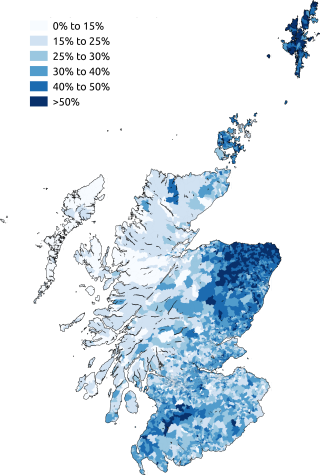
Scots is a language variety descended from Early Middle English in the West Germanic language family. Most commonly spoken in the Scottish Lowlands, the Northern Isles of Scotland, and northern Ulster in Ireland, it is sometimes called: Lowland Scots, to distinguish it from Scottish Gaelic, the Celtic language that was historically restricted to most of the Scottish Highlands, the Hebrides, and Galloway after the sixteenth century; or Broad Scots, to distinguish it from Scottish Standard English. Modern Scots is a sister language of Modern English, as the two diverged from the same medieval form of English.
Lallans, is a term that was traditionally used to refer to the Scots language as a whole. However, more recent interpretations assume it refers to the dialects of south and central Scotland, while Doric, a term once used to refer to Scots dialects in general, is now generally seen to refer to the Mid Northern Scots dialects spoken in the north-east of Scotland.

Robert Fergusson was a Scottish poet. After formal education at the University of St Andrews, Fergusson led a bohemian life in Edinburgh, the city of his birth, then at the height of intellectual and cultural ferment as part of the Scottish Enlightenment. Many of his extant poems were printed from 1771 onwards in Walter Ruddiman's Weekly Magazine, and a collected works was first published early in 1773. Despite a short life, his career was highly influential, especially through its impact on Robert Burns. He wrote both Scottish English and the Scots language, and it is his vivid and masterly writing in the latter leid for which he is principally acclaimed.
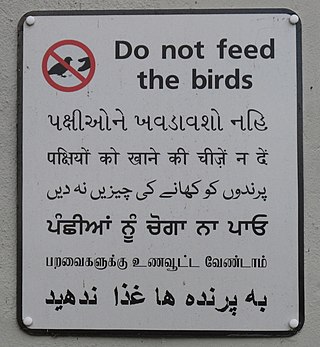
English is the most widely spoken and de facto official language of the United Kingdom. A number of regional and migrant languages are also spoken. Regional English variant languages are Scots and Ulster Scots; indigenous Celtic languages are Irish, Scottish Gaelic and Welsh. There are many non-native languages spoken by immigrants, including Polish, Hindi, and Urdu. British Sign Language is sometimes used as well as liturgical and hobby languages such as Latin and a revived form of Cornish.

The Royal Scottish Academy building, the home of the Royal Scottish Academy, is an art museum in Edinburgh, Scotland. It is situated at the junction of The Mound and Princes Street in the centre of the city. It was built by William Henry Playfair in 1822-6. Along with the adjacent National Gallery of Scotland, their neo-classical design helped to transform Edinburgh into the cityscape known as "the Athens of the North". Today the structure is a Category A listed building.
The Scottish Corpus of Texts & Speech (SCOTS) is an ongoing project to build a corpus of modern-day (post-1940) written and spoken texts in Scottish English and varieties of Scots. SCOTS has been available online since November 2004, and can be freely searched and browsed. It reached 4.7 million words by 2015.

Symbiosis Law School (SLS) is a law school with campuses located in Pune, Noida, Hyderabad, and Nagpur in India. The law school in Pune was established in 1977 under the banner of Symbiosis Society, under the patronage of S. B. Mujumdar, President and Founder Director. It is registered under the Societies Registration Act, 1860, and the Bombay Public Trust, Act, 1950. Symbiosis Law School is a constituent college of the Symbiosis International University.
Alexander Scott (1920–1989) was a Scottish poet, playwright and scholar born in Aberdeen. He wrote poetry in both Scots and Scottish English as well as plays, literary reviews and critical studies of literature. As a writer, scholar, dramatist, broadcaster, critic and editor, he showed a life-long commitment to Scottish literary culture. He was latterly a tutor and reader of Scottish literature at the University of Glasgow, where he was instrumental in establishing Scotland's first Department of Scottish Literature in the academic year 1971–72.
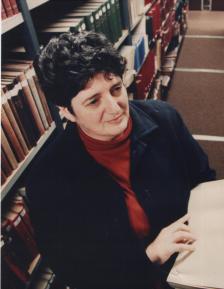
Sheena Blackhall is a Scottish poet, novelist, short story writer, illustrator, traditional story teller and singer. Author of over 180 poetry pamphlets, 15 short story collections, 4 novels and 2 televised plays for children, The Nicht Bus and The Broken Hert. Along with Les Wheeler, she co-edits the Doric resource Elphinstone Kist, and has worked on the Aberdeen Reading Bus, as a storyteller and writer, also sitting on the editorial board for their children's publications in Doric, promoting Scots culture and language in the North East. In 2018, Aberdeen University awarded her the degree of Master of the University. In 2021 she was appointed SPL’s poetry ambassador for the Scots language.
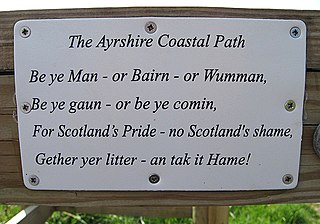
Modern Scots comprises the varieties of Scots traditionally spoken in Lowland Scotland and parts of Ulster, from 1700.

The Scottish people or Scots are an ethnic group and nation native to Scotland. Historically, they emerged in the early Middle Ages from an amalgamation of two Celtic peoples, the Picts and Gaels, who founded the Kingdom of Scotland in the 9th century. In the following two centuries, Celtic-speaking Cumbrians of Strathclyde and Germanic-speaking Angles of Northumbria became part of Scotland. In the High Middle Ages, during the 12th-century Davidian Revolution, small numbers of Norman nobles migrated to the Lowlands. In the 13th century, the Norse-Gaels of the Western Isles became part of Scotland, followed by the Norse of the Northern Isles in the 15th century.
The Society of Swedish Literature in Finland is a scholarly society for the collection, archiving and dissemination of knowledge about Finland-Swedish culture. SLS publishes scholarly literature, maintains archives and libraries, funds research and awards literary and scholarly prizes and scholarships. SLS's activity is made possible by private donations. SLS is one of the largest managers of private charitable funds in Finland.
Neil R. MacCallum was a Scottish nationalist political activist and poet.

MairiRobinson was best known for her dedication towards the study of the Scottish language and Scottish lexicography. She worked on the later stages of the Scottish National Dictionary and became the editor-in-chief where she oversaw the 1985 publication for the Concise Scots dictionary. She was Scots language consultant for the complete edition of Sir Walter Scott's novels. She was committed to adult learning. Her work has been a noteworthy contribution to the Scots language and to the confidence of the Scottish people about their language.
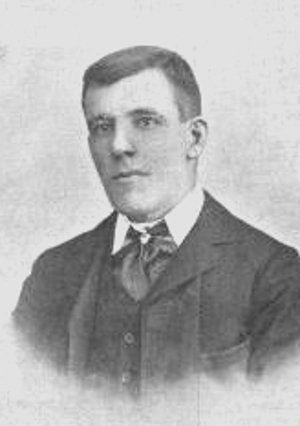
John Malcolm Bulloch (1867–1938) was a Scottish journalist and magazine editor, known also as a genealogist, and a literary and theatre critic.
Dr. David Purves was a Scottish environmental scientist, playwright and poet, and a champion of the Scots language.











